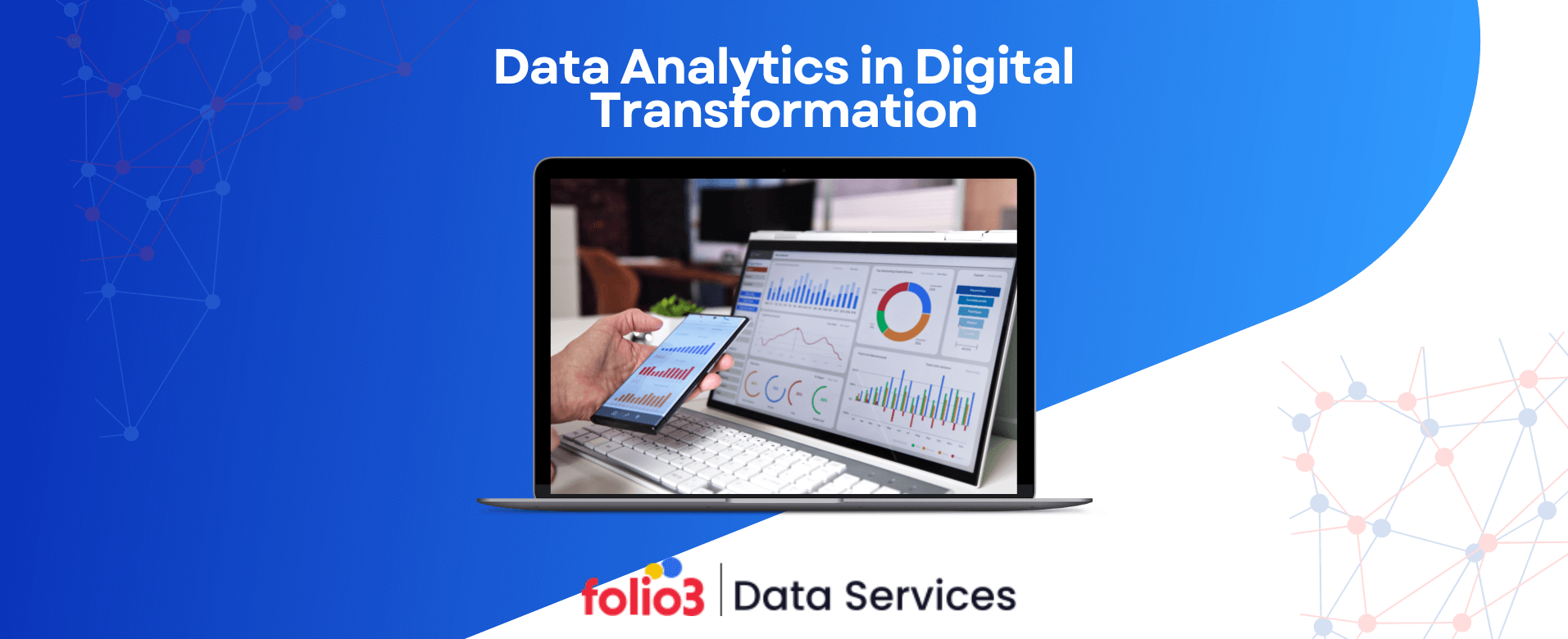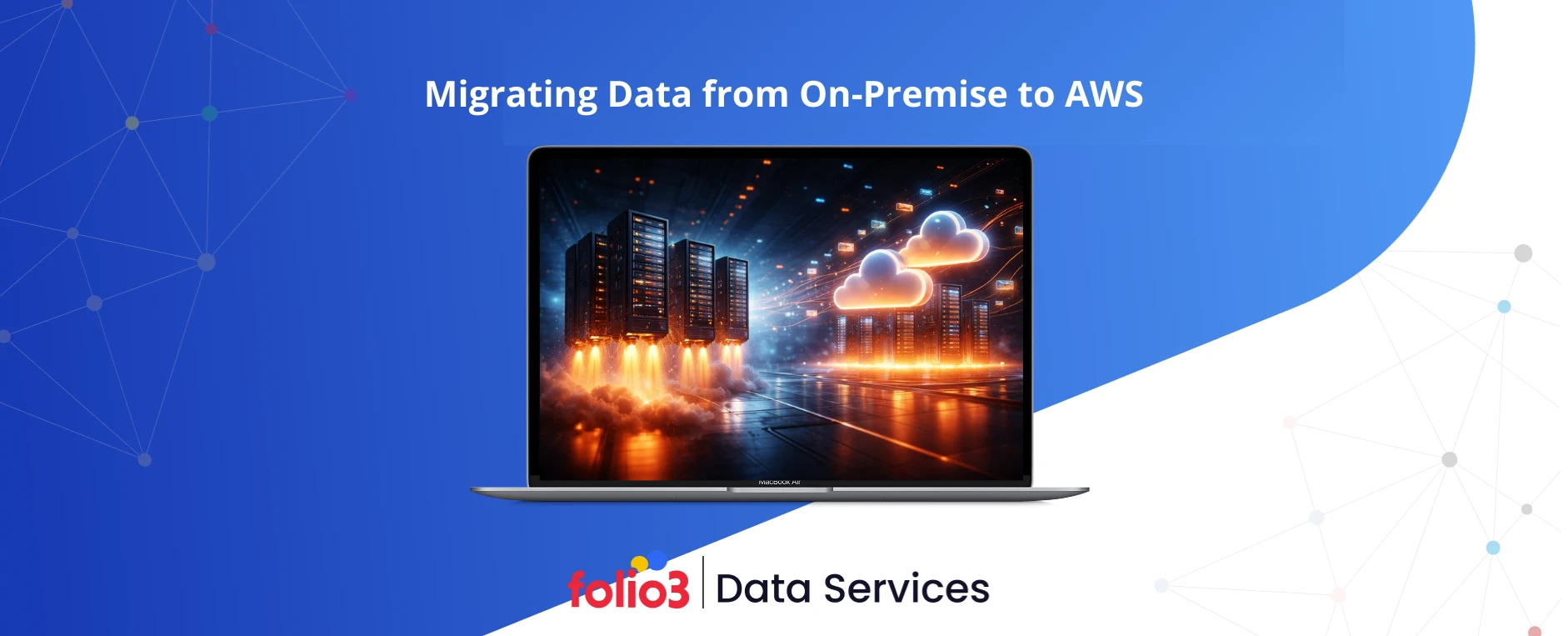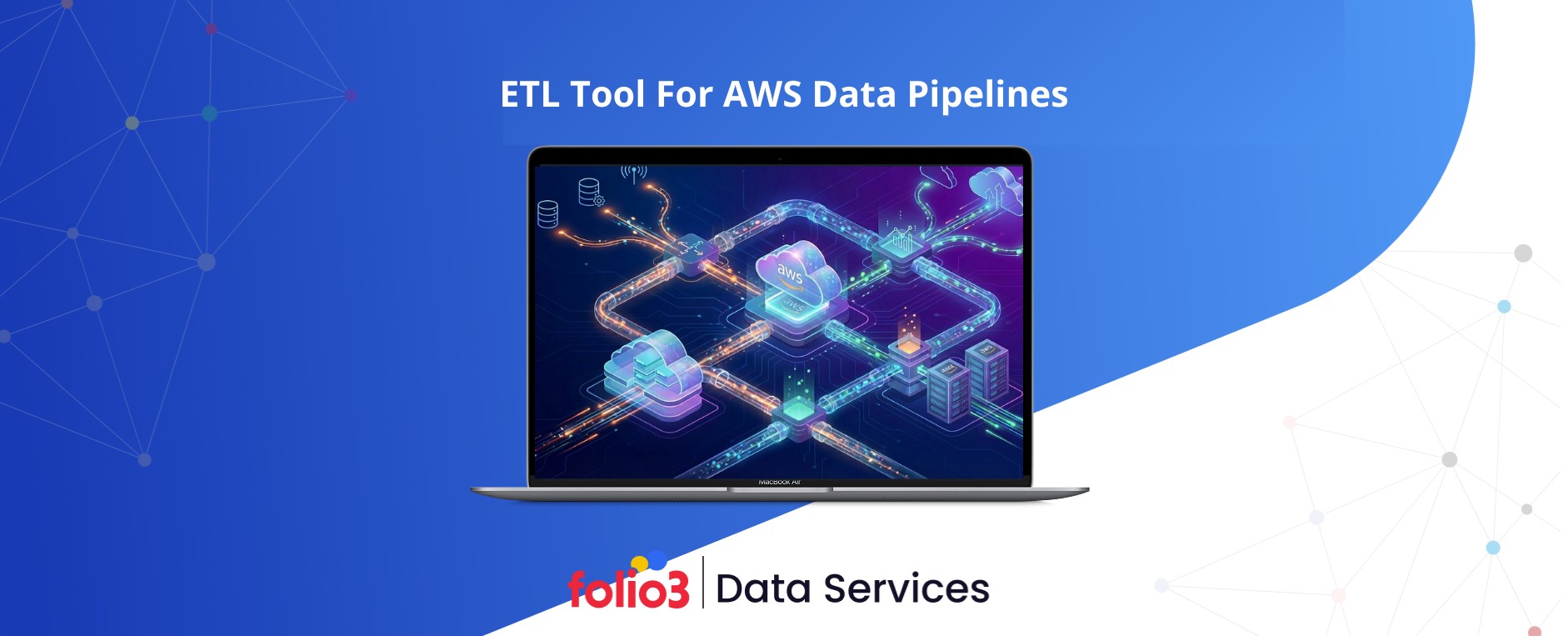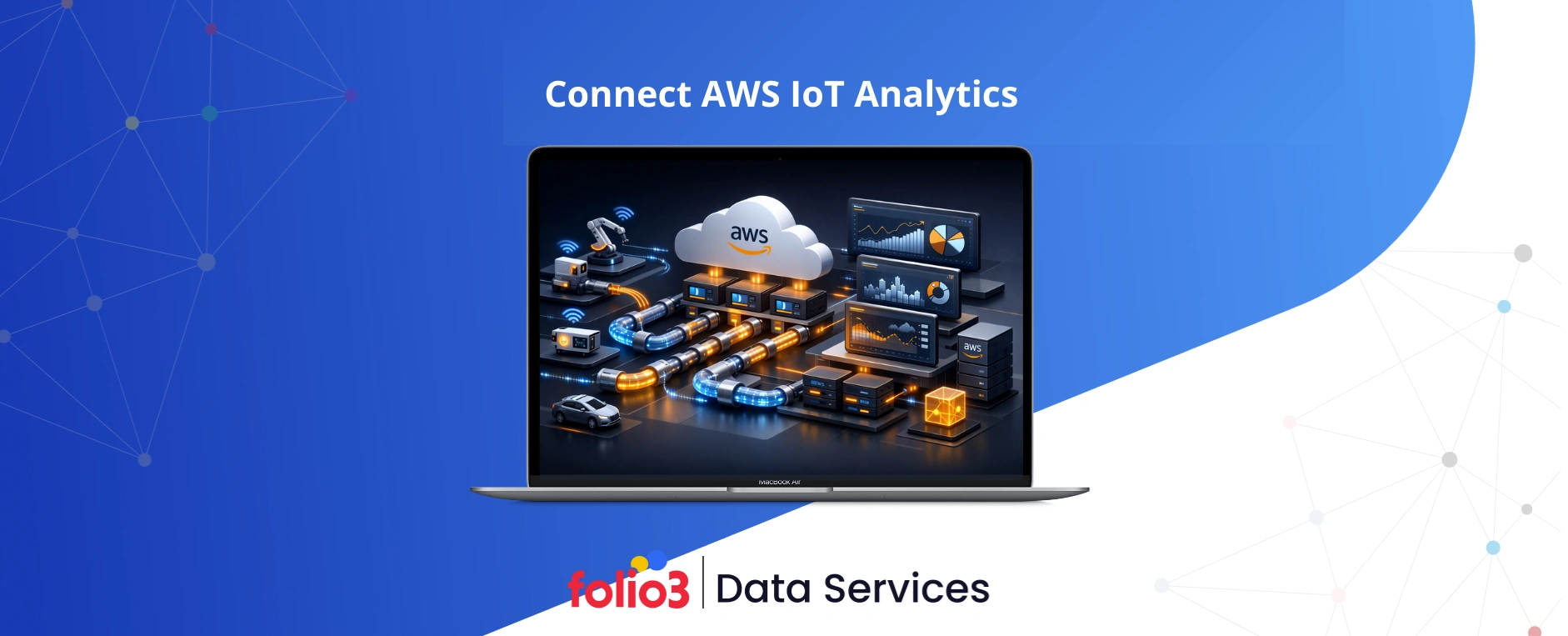Data analytics has become the linchpin of modern business strategies, driving digital transformation across industries. With the rise of big data, organizations increasingly rely on data-driven insights to navigate the complexities of today’s market, optimize operations, and enhance customer experiences.
The synergy between data analytics and digital transformation reshapes industries, making businesses more agile, responsive, and competitive.
According to Statista, the global value of digital transformation data analytics investments is projected to reach over $100 billion by 2026, reflecting the growing importance of data in driving digital innovation.
The purpose of this blog is to offer a comprehensive overview of the vital role data plays in digital transformation, along with the key components and techniques of data analytics that drive this process.
What is Digital Transformation?
Digital transformation refers to integrating digital technologies into all business areas, fundamentally changing how organizations operate and deliver customer value. It involves a cultural shift that requires businesses to continuously challenge the status quo, experiment, and adapt to new technological advancements.
Digital transformation is not just about technology; it’s about using technology to reimagine business processes, improve efficiency, and create new value propositions. Here’s a detailed look at what digital transformation entails:
The Role of Data Analytics in Digital Transformation and Business Analytics
Data analytics is crucial for digital transformation. It provides actionable insights that drive strategic decision-making, enhance operational efficiency, and improve customer experiences.
As organizations undergo digital transformation, the ability to effectively analyze and interpret data becomes central to their success.
Here’s a detailed look at how to achieve digital transformation through data analytics strategy:
1. Enhancing Decision-Making
Data analytics plays a pivotal role in digital transformation by enabling real-time decision-making. Advanced analytics techniques allow businesses to gain predictive insights, allowing for more informed strategic planning and proactive decision-making.
2. Improving Customer Experience
Data analytics for digital transformation is essential for understanding customer behavior and preferences. By leveraging data, businesses can personalize customer interactions and map out customer journeys more effectively, enhancing customer satisfaction and loyalty.
Optimizing Operations
Operational efficiency is the crucial goal of digital transformation; data analytics is at the forefront of this effort. Businesses can identify inefficiencies, reduce costs, and align the processes by analyzing operational data. Industries such as manufacturing, logistics, and retail have benefited from big data platforms and data-driven operational improvements.
Let’s work together to turn your data into powerful insights that drive success.
Key Components of Digital Transformation
Digital transformation is a multi-faceted journey beyond simply adopting new technologies; it involves a fundamental shift in how organizations operate, deliver value, and engage with customers.
Successful digital transformation requires a holistic approach, encompassing various key components that drive innovation, efficiency, and growth.
These components range from technology adoption to organizational culture, which is essential for businesses looking to stay competitive in an increasingly digital world.
Understanding these elements is crucial for any organization aiming to harness the full potential of digital transformation:
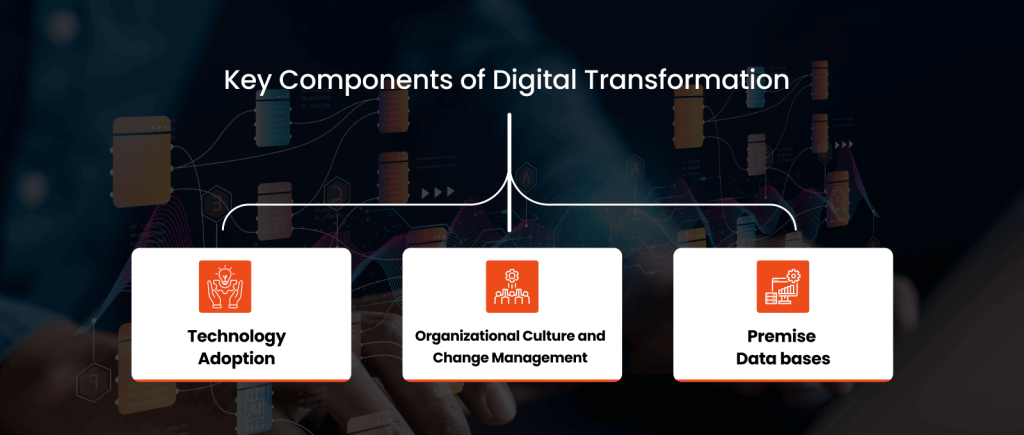
Technology Adoption
The adoption of innovative technologies is central to digital transformation. Cloud computing, for example, allows businesses to scale operations efficiently, while AI and machine learning automate complex processes, driving innovation and efficiency. The Internet of Things (IoT) connects devices and gathers vast amounts of data, providing valuable insights that drive smarter decision-making.
Organizational Culture and Change Management
Successful digital transformation requires more than just technology; it necessitates a shift in organizational culture. Companies must foster a culture of innovation and agility, with leadership playing a critical role in guiding the transformation process. Engaging employees and securing their buy-in ensures a smooth transition and sustained success.
Business Process Automation
Automation is a crucial component of digital transformation. Robotic Process Automation (RPA) can accelerate repetitive tasks, reduce manual errors, and increase productivity, freeing employees to focus on more strategic activities.
Coca- Cola Data, Insights & Analytics: Real Life Example

Coca-Cola Hellenic Bottling Company (HBC) has effectively utilized big data and advanced analytics to address specific challenges and implement targeted solutions, particularly in markets like Nigeria.
Challenges:
Coca-Cola Hellenic Bottling Company (HBC) faced a significant hurdle in the Nigerian market, where the trade environment is highly fragmented. The diversity of retail outlets and customer needs made it challenging to implement consistent market segmentation and craft targeted strategies that resonated across different regions.
This complexity was further amplified by the need to cater to varied drinking occasions and preferences, requiring a localized and agile approach.
Solutions:
To address these challenges, Coca-Cola HBC leveraged advanced analytics and big data to revolutionize its market approach:
- Precise Outlet Segmentation: Through sophisticated analytics tools, Coca-Cola HBC achieved an in-depth understanding of Nigeria’s fragmented trade landscape. This allowed the company to classify retail outlets into distinct segments, enabling the delivery of tailored activation strategies that aligned with specific customer needs.
- Localized Activations in Key Markets: In Lagos, for example, the company utilized data insights to craft targeted campaigns. During the Easter season, they focused on activating outlets near major churches, offering products that matched the celebratory spirit. Simultaneously, premium products were introduced in wealthier areas to cater to their preferences.
- Sales Force Enablement: Coca-Cola HBC used data analytics to enhance its segmented execution model. The insights provided actionable recommendations to the sales teams, such as which products to prioritize and in what quantities. This not only reduced out-of-stock incidents but also improved overall operational efficiency.
By adopting a data-driven strategy, Coca-Cola HBC successfully transformed its operations in Nigeria, optimizing service delivery and strengthening customer engagement in a complex market.
How Data Analytics is Changing the World of Digital Transformation

1. Integration of Digital Technologies
Digital transformation involves embedding digital technologies into every facet of an organization. This means adopting technologies such as cloud computing, artificial intelligence (AI), machine learning, and the Internet of Things (IoT) to enhance operations and business models. These technologies smooth processes, improve data management, and enable innovative ways of engaging with customers. Utilizing data strategy consultancy ensures that these technologies align with business goals.
2. Reimagining Business Processes
At the heart of digital transformation is the reimagining of traditional business processes. Companies use digital tools to rethink how they deliver their products or services. This can involve automating routine tasks, optimizing supply chains, and implementing new, data-driven approaches to decision-making.
For example, a retailer might use data analytics and big data implementation to refine inventory management and personalize marketing efforts, improving customer satisfaction and operational efficiency.
3. Cultural Shift and Change Management
Successful digital transformation requires a cultural shift within the organization. Employees must embrace new working methods, often requiring a move away from traditional methods. This cultural change involves fostering an environment of continuous learning and experimentation, where employees are encouraged to challenge the status quo and adapt to new technological advancements.
Understanding the rapid growth of the data analytics market size can help illustrate why these new skills are valuable and why embracing modern tools is essential for staying competitive.
4. Continuous Improvement and Adaptation
Digital transformation is not a one-time project but a continuous journey. Organizations must regularly assess and update their digital strategies to stay ahead of technological trends and changing market demands.
This ongoing process involves experimenting with new technologies, gathering feedback, and iterating on strategies to ensure they remain relevant and practical.
5. Creating New Value Propositions
One key goal of digital transformation is to create new value propositions for customers. By leveraging digital technologies, companies can offer enhanced experiences, new products or services, and more personalized interactions.
For instance, a company might use AI to offer predictive maintenance services, providing customers with timely alerts and solutions before problems arise. In industries like energy, organizations are also adopting digital oilfield solutions to create smarter operations, improve decision-making, and deliver more value to customers through predictive insights.
6. Improving Efficiency
Digital transformation aims to improve operational efficiency by automating processes, reducing manual tasks, and enhancing data accuracy. This can lead to cost savings, faster turnaround times, and better resource utilization. For example, automating invoicing processes can reduce administrative overhead and minimize errors, leading to more efficient financial operations.
7. Enhancing Customer Experience
Companies can deliver more personalized and engaging customer experiences by adopting digital technologies. Data analytics, for instance, enables businesses to understand customer preferences and behavior, allowing for targeted marketing and customized services. Enhanced customer experiences often lead to increased satisfaction and loyalty.
Data Analytics Tools and Techniques in Digital Transformation
Data analytics is at the heart of digital transformation, enabling businesses to turn vast data into actionable insights. The tools and techniques used in data analytics play a vital role in this process, helping organizations to make informed decisions, optimize operations, and stay competitive in a rapidly evolving digital landscape.
From advanced data visualization platforms to predictive modeling and real-time analytics, these tools are essential for unlocking data’s true potential in driving transformation.
Key Data Analytics Tools
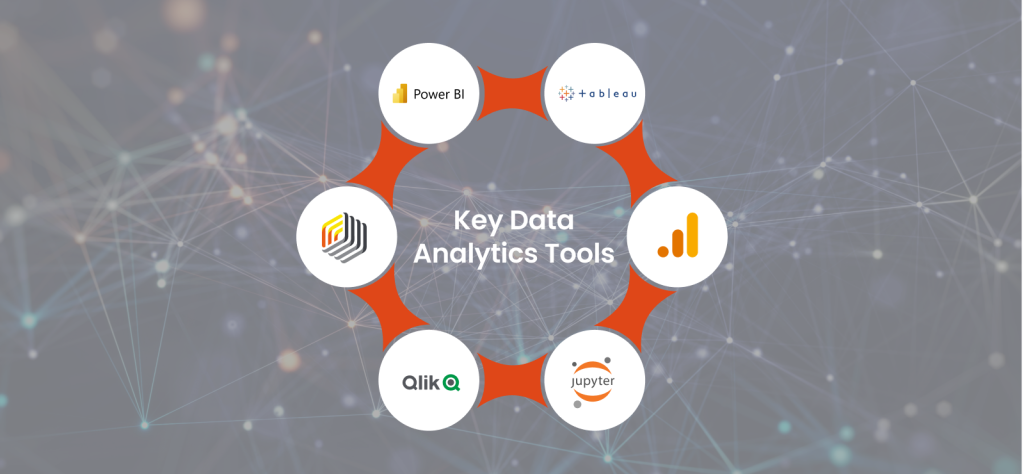
Several powerful data analytics tools are driving digital transformation.
- Power BI,
- Tableau,
- Google Analytics
- Project Jupyter
- Qlik
- RapidMiner
These tools allow businesses to analyze data in real-time, visualize trends, and make data-driven decisions.
Advanced Techniques
Advanced data analytics techniques for digital transformation, including data mining, predictive modeling, and real-time analytics, are essential for gaining deeper insights into business operations. Data visualization and dashboards further enhance the ability to interpret complex data, making it accessible and actionable for decision-makers.
Integration with Existing Systems
Integrating new data analytics tools for digital transformation with legacy systems can be challenging but is crucial for achieving a seamless digital transformation. Businesses must develop strategies to overcome data migration issues and fully ensure compatibility between old and new systems to use data analytics’s power.
Folio3’s Role in Driving Digital Transformation Through Data Analytics
At Folio3, we help organizations unlock the true potential of their data to fuel digital transformation. Through our comprehensive data analytics services, we enable you to uncover actionable insights, streamline operations, and build data-driven strategies that deliver measurable business growth.
Here’s how we can support your transformation journey:
- Scalable Cloud Infrastructure: Modernize your data ecosystem with secure, scalable cloud-based solutions.
- Custom Data Solutions: Tailored analytics frameworks to fit your unique business goals and industry needs.
- Seamless Integration: Smooth data integration across platforms, ensuring accuracy and consistency for better decision-making.
- Advanced Analytics & AI: Leverage predictive modeling, machine learning, and automation to gain deeper insights and forecast trends.
- Real-Time Dashboards: Empower your teams with interactive visualizations for smarter, faster decision-making.
Transform your data into a strategic advantage — explore our data analytics services today.
FAQs
How does data analytics support digital transformation?
Data analytics enables actionable insights, informed decision-making, optimized operations, and enhanced customer experiences, making it a cornerstone of digital transformation strategies.
What industries benefit the most from data analytics?
Data analytics significantly benefits the retail, manufacturing, finance, healthcare, and logistics industries. These industries leverage insights to improve efficiency, reduce costs, and enhance customer satisfaction.
What are the key challenges in integrating data analytics in digital transformation?
Key challenges include data integration with legacy systems, ensuring data quality, managing large volumes of data, and securing employee buy-in for the new tools and processes.
Final Words
Data analytics is undeniably a cornerstone of digital transformation, offering businesses the tools and insights needed to navigate the digital landscape successfully.
As organizations continue to invest in data analytics, those that partner with Folio3 Cloud and Data services can use these capabilities effectively and be better positioned to drive innovation, enhance customer experiences, and achieve sustained growth in the digital era.
So, partner with Folio3 data services and use these data-driven strategies that are not just an option but necessary for businesses aiming to thrive in today’s competitive environment.
